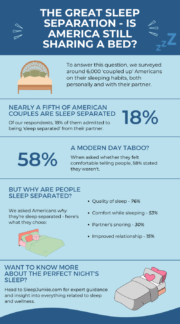Getting Away to Sleep
- A significant number of American workers have unused vacation days, with the majority not utilizing their full allotted time off due to various factors, including workload and last-minute trip planning.
- Some individuals feel more comfortable or productive in the workplace and may choose to forgo vacation time for various reasons. Employers may need to address factors contributing to employees’ reluctance to take time off.
- Vacation destinations impact sleep quality, with beach destinations demonstrating a positive influence on the sleep experiences of many respondents, though unfamiliar surroundings, temperature differences, and noise disruptions in new settings can lead to poorer sleep quality.
What does the word “vacation” bring to mind? Soothing sandy beaches or maybe a long hike through the woods? Are you bringing the whole family or going solo? Whatever your dream vacations are made of, your day-to-day life may leave you wishing that you had time off work just to sleep and recharge – or maybe even do a little more work.
For employees who had taken vacations in the past year, time spent away from the office showed some interesting trends. In fact, unused paid vacation days may be more common than you think. Read on to see how employees used and even slept through their time out of office.
Taking a Break
The majority – 68% – of all working Americans had unused vacation days from the past corporate year. With 14 days of PTO per year, only an average of 10 were used. In light of Americans falling drastically behind other countries in terms of paid vacation days, even a single day of unused time off seems unexpected, let alone four.
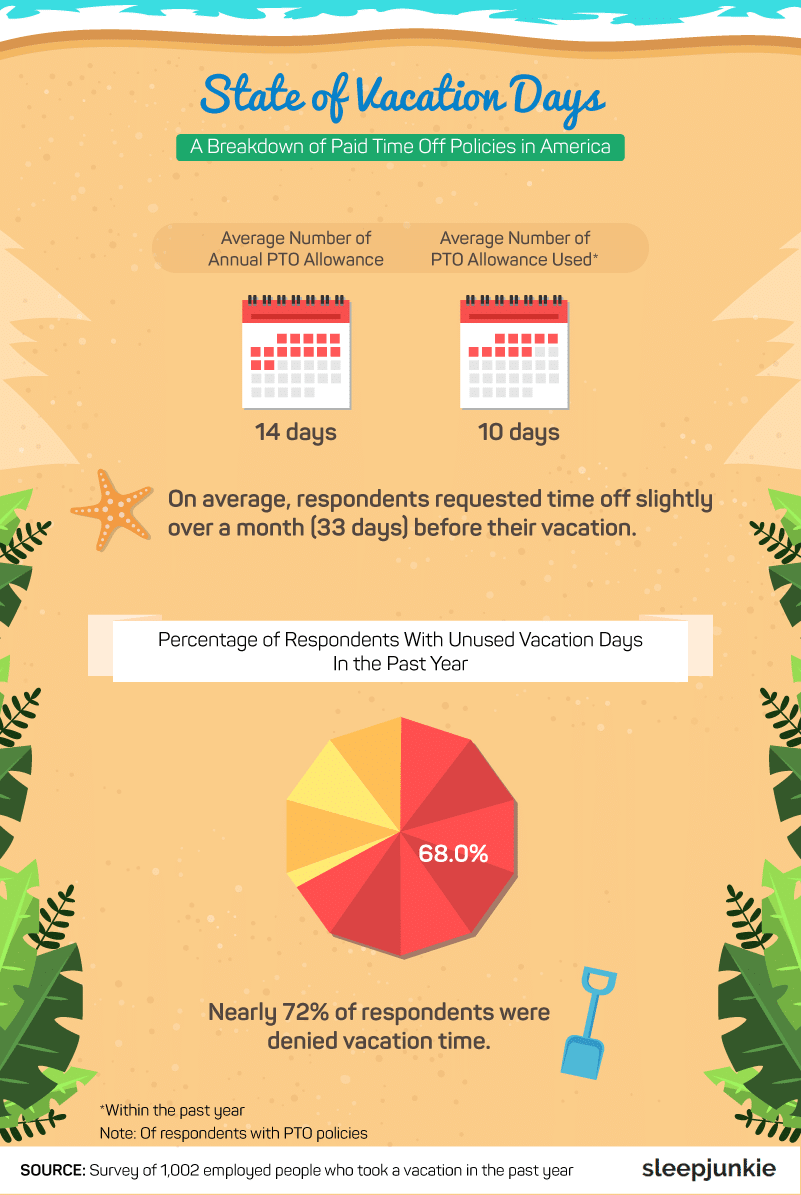
One possible explanation for forgone vacation time could be the required planning. Even if an employee had several unused vacation days before the year’s end, unexpected workloads or plans for their absence could present barriers. On average, respondents asked for time off 33 days before the requested vacation day. This additional heads-up may be necessary, as 72% of respondents were denied their requested vacation times.
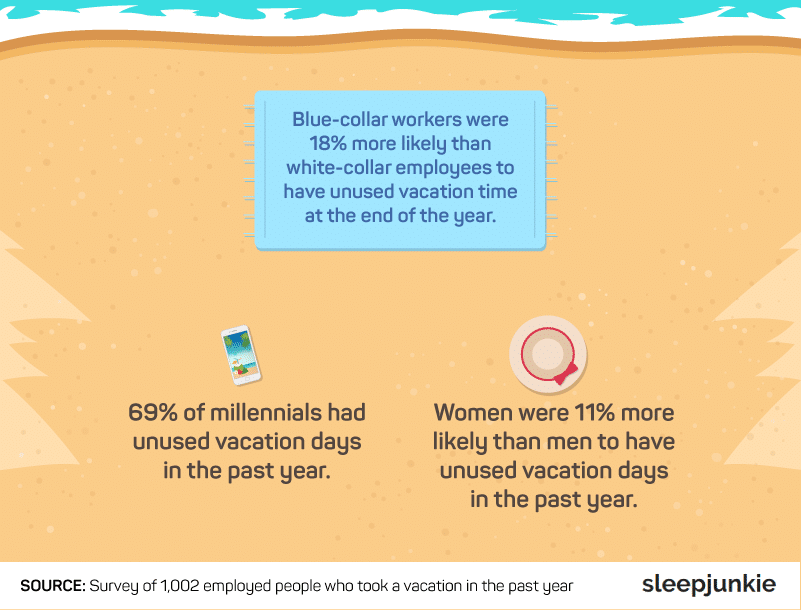
An Abundance of PTO
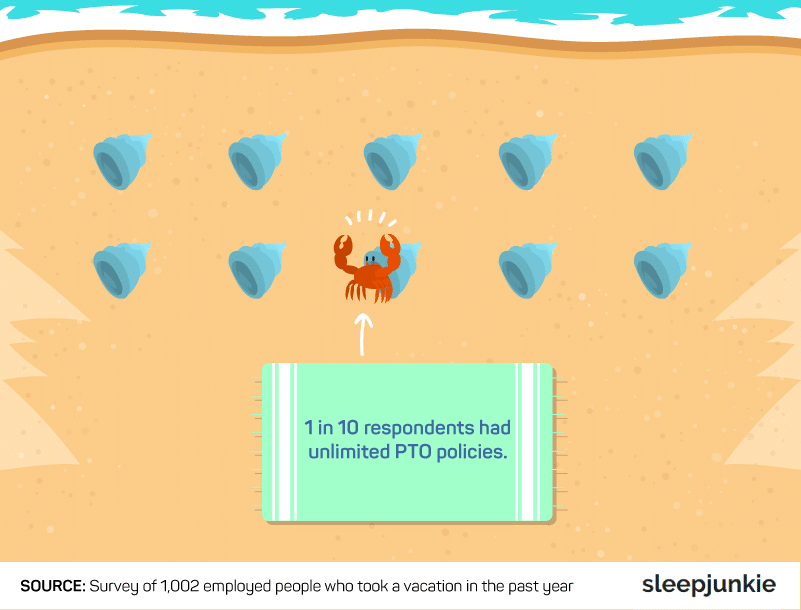
Of the 1,002 employed people who had taken a vacation in the past year, 1 in 10 said their companies offered unlimited paid time off. While this may sound like a dream come true, this abundance of PTO often translates to more days in the office. Companies offering unlimited PTO often see their employees take fewer vacation days than companies that limit vacation time. Employees may feel pressured to take comparatively fewer vacation days than their co-workers to get ahead. Others may respond to the lack of limit with a sense of guilt when asking to take time beyond the standard two weeks. Some may just be trying to avoid a potential “mountain of work” after leaving the office for longer periods.
Working Over Vacation
If it seemed surprising that Americans would choose to forgo paid vacation days in lieu of work, it may be helpful to understand a little more of the working mindset across the country. Twenty-two percent of working Americans would prefer going to work over vacationing. And even though many consider millennials’ work ethic to be poor, 1 in 4 respondents from this generation wanted to work instead of going on vacation.
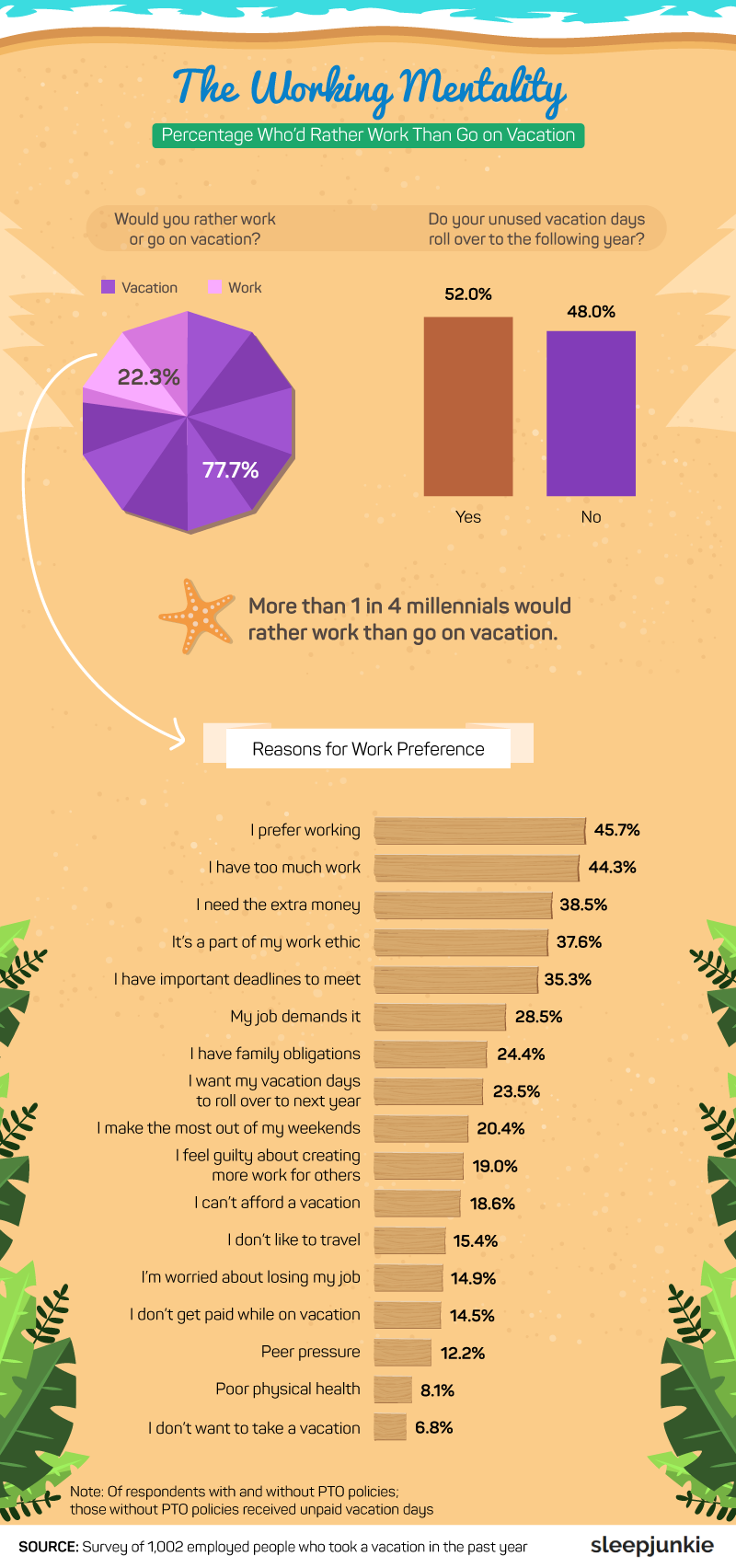
Of the 22% who would work instead of vacation, 45.7% said they simply preferred to work. Why you ask? Maybe it’s the fact that 44.3% of those who chose work had too much of it to find the time to leave. Or maybe it’s due to 38.5% needing the extra money.
While on vacation, 47 percent of millennials feel guilty for relaxing, making that vacation feeling less than refreshing. Whatever your generation, American offices don’t necessarily hard-wire employees for carefree, unplugged vacations. Even if they do, workers may not have the financial or logistical flexibility to leave their desk.
Vacation Eve
As it turns out, Americans procrastinate on more than their work assignments. Sixty-three percent of respondents had to stay up late the night before they left for vacation, and the majority of the time, it was just to finish packing. Other important details, when left to the last minute, also caused respondents to forgo sleep on vacation eve. Twenty-nine percent had to stay up late to finish planning the trip, 15.4% still had to confirm their reservations, and 10.5% had to find a place to stay during their trip.
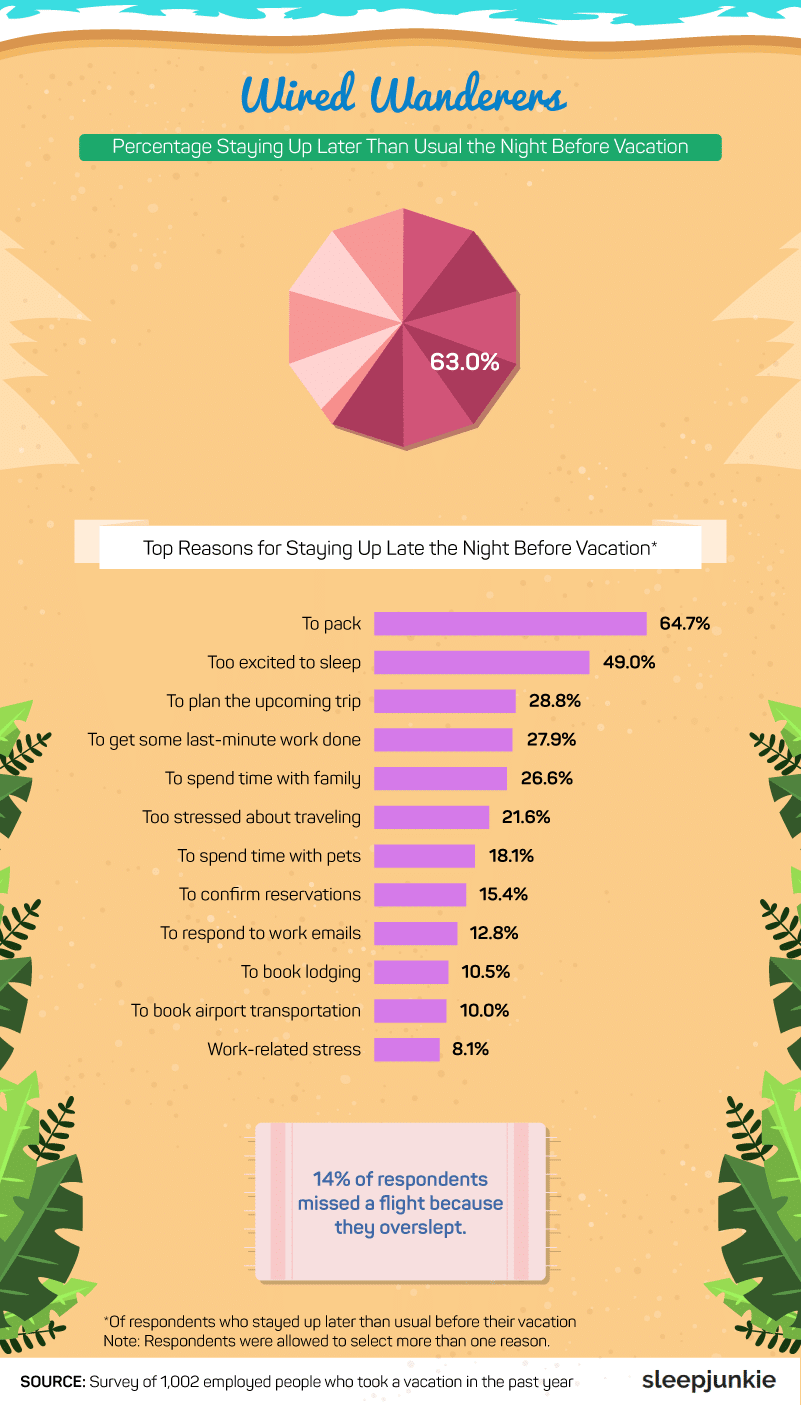
Thankfully, work-related stress wasn’t very likely to keep respondents up the night before a trip. Only 8.1% of late-nighters mentioned work stress. Nevertheless, this specific source of stress is reported to plague 65% of Americans. Whatever the source of stress, it’s important to mitigate its impact on sleep, whether you’re due for a vacation or work the next morning. A lack of sleep impacts both work and general mood, so de-stress and get some rest.
Sleep the Time Off
One of the most popular vacation destinations for Americans this year was the land of sleep. Almost 43% of respondents reported better quality sleep during their time off, while 42.6% earned a greater quantity of sleep. In fact, 43% of respondents took a vacation with the specific intention of improving their sleep quality.
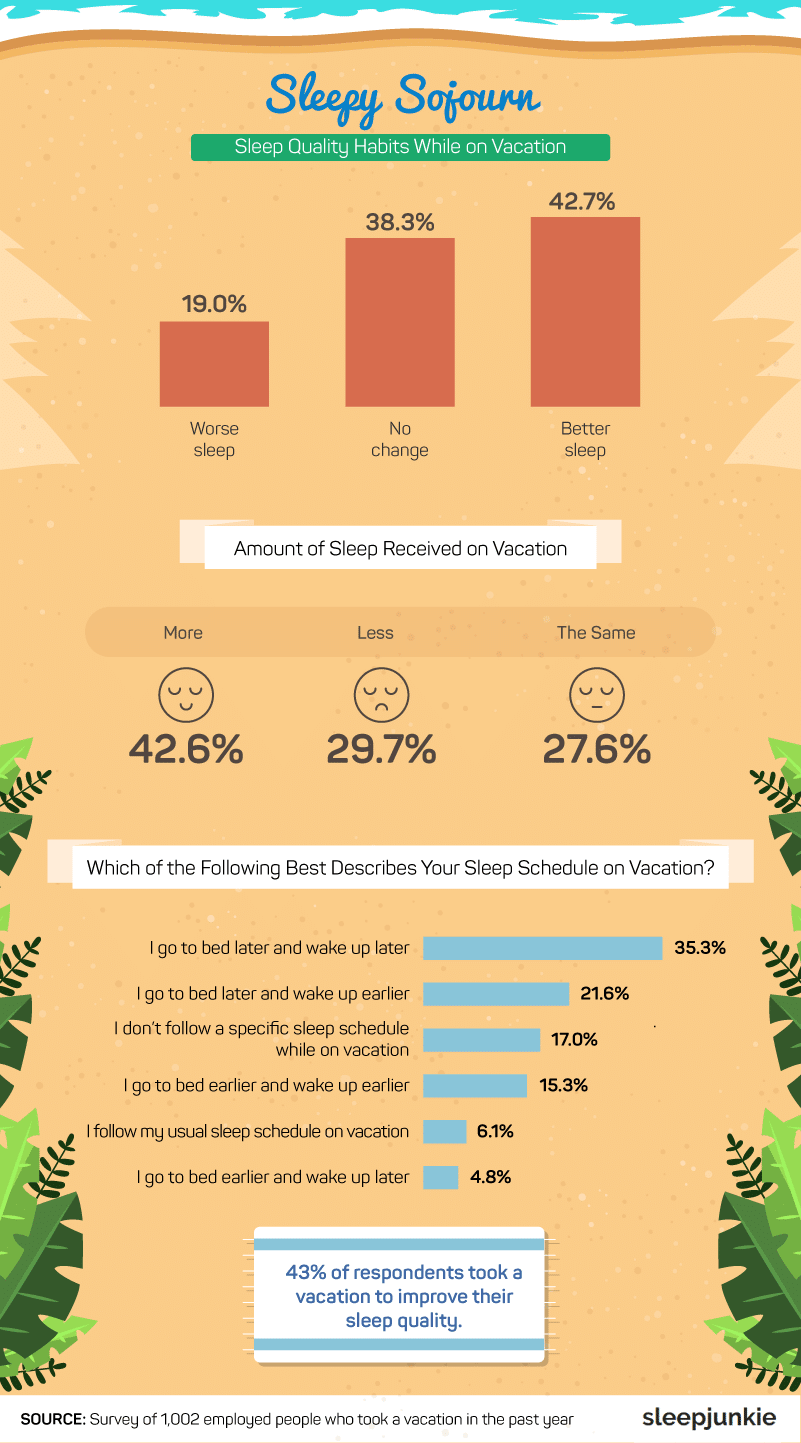
Even the sleepiest of intentions, however, didn’t always lead to more rest: 19% actually slept worse while out of office. If you’re not facing an alarm the next morning, staying up late might seem more appealing. Or maybe staying out later becomes more tempting without a looming morning meeting. In fact, less than 5% of respondents went to bed earlier and woke up later while on vacation. Most often, they went to bed later than normal and compensated with extra time to sleep the next morning.
Tropical Snooze
For the lucky 43% whose rest improved while on vacation, the beach was the most popular route to bedtime bliss. Twenty-one percent of beachgoers found good or excellent sleep while relaxing seaside, compared to 15.3% of those traveling to foreign countries and 14.7% each of those on road trips and staycations. The success of beach sleep may be due to the sun’s impact on our energy. The heat and added sun exposure can put the most active person to bed.
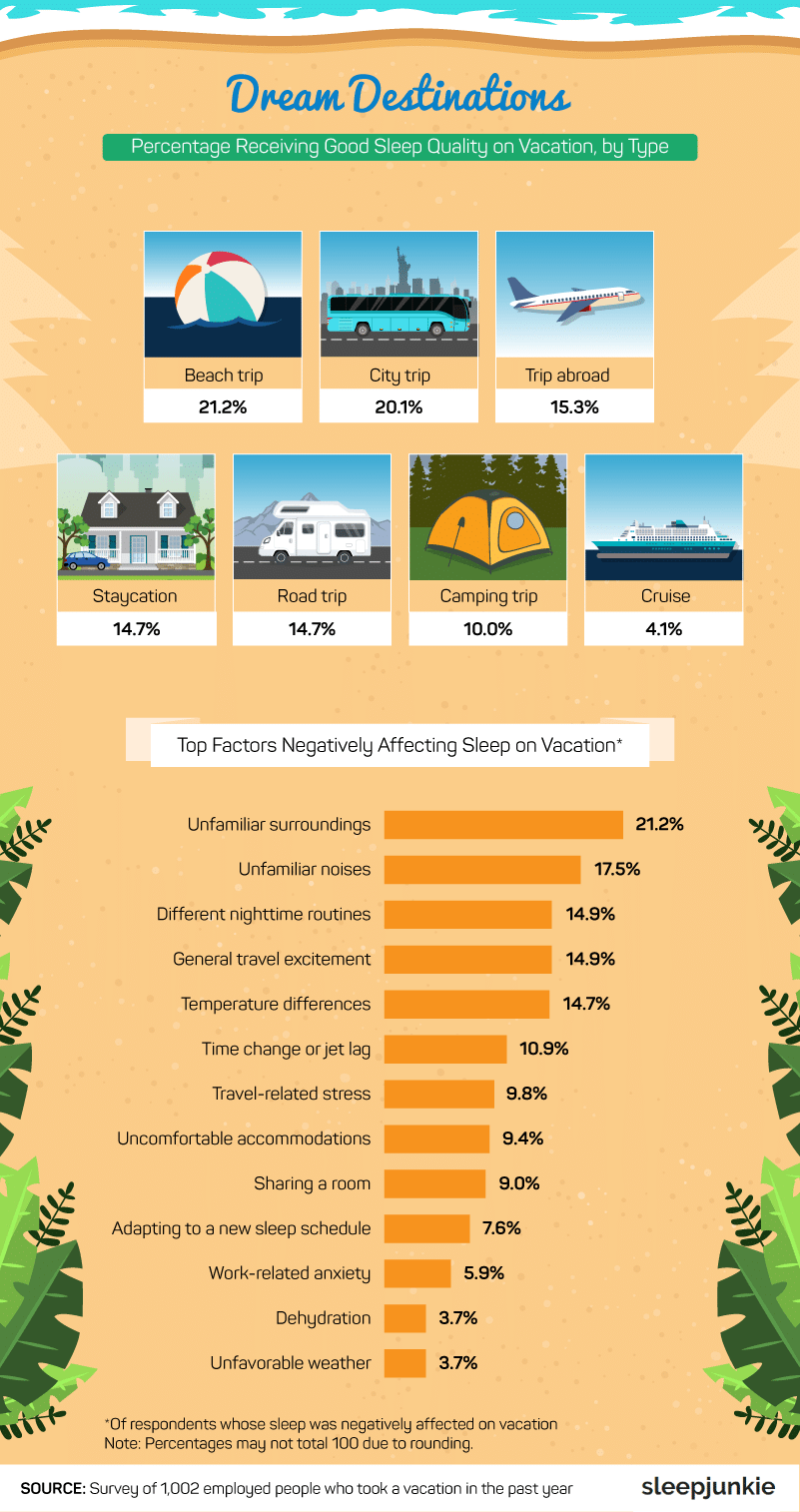
Camping trips and cruises most negatively impacted sleep quality while on vacation. Just 10% and 4% were able to sleep well in these destinations, respectively. In these locations and elsewhere, respondents cited unfamiliar surroundings (21.2%) and unfamiliar sounds (17.5%) as the greatest barriers to high-quality rest. Inability to control temperature differences also bothered 14.7% of vacationers, which likely partially explains the difficulty of sleeping when camping.
Vacations and Expectations
Modern American vacation expenses can accumulate quickly. Round-trip tickets, hotels, food, and room for spontaneity can get expensive. There is, however, another major yet unspoken expense: the workplace toll.
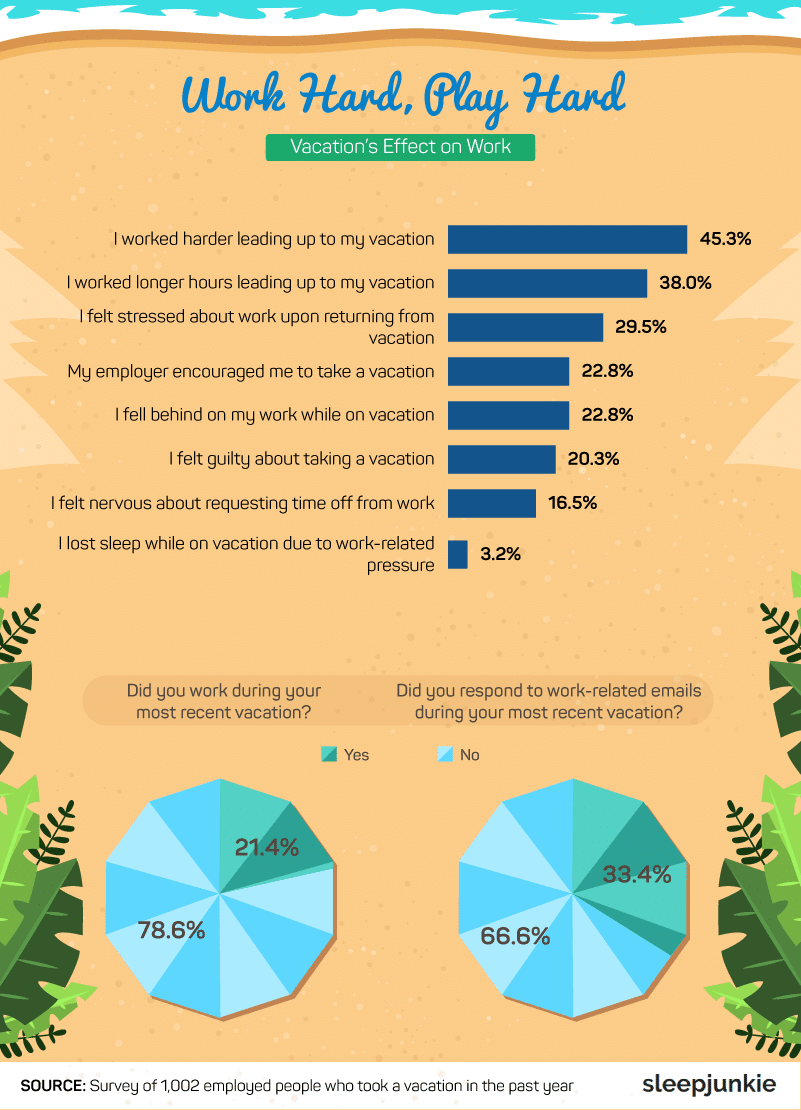
Before taking a break, 45.3% of respondents said they worked harder in the time leading up to their vacation. Another 38% worked longer hours to take time off. These arduous, longer hours may be the result of not wanting to fall behind in their workloads. Or the extra hours are compensating for feelings of guilt about spending time away. In fact, 20.3% of respondents admitted to feeling guilty for taking time off at all.
Whether guilt-induced or not, work does occur on many American vacations. Over 21% of respondents claimed to have spent at least some of their vacation working. Additionally, 33.4% said they checked work-related emails during their time off. One key point to notice here is the 12 percentage point difference between those who worked and those who said they just checked emails. It essentially means that significant numbers of Americans don’t consider checking work-related emails to be work, even if they are on vacation.
Returning Refreshed
Even the most common vacation feelings weren’t enjoyed by everyone. The most reported vacation experience was a positive one, but it was only experienced by about half of vacationers: 52.9% said they returned to work feeling relaxed. “Recharged” and “Happy” were two of the other most commonly reported side effects of a break from work, enjoyed by 46.4 and 45.7 percent of vacationers, respectively.
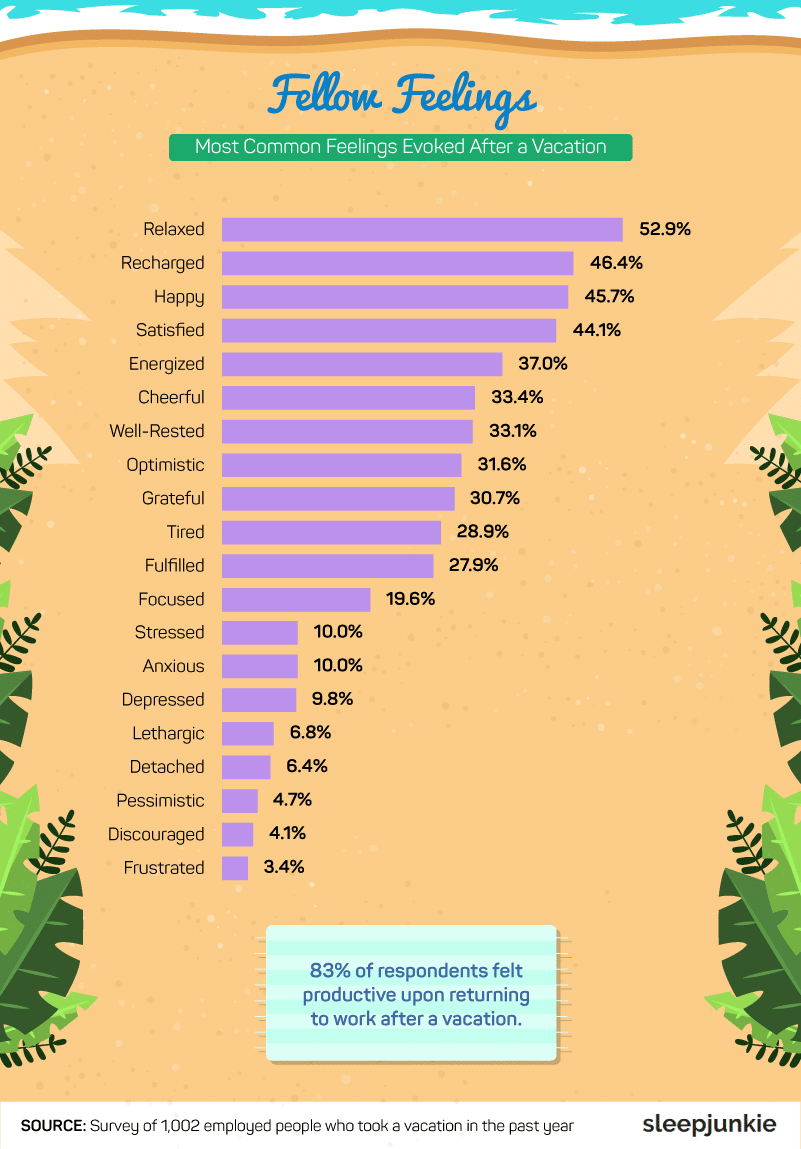
Employers may want to take note, as happy workers are better workers, simply put. Whether or not vacation policies are limited, workers need encouragement and flexibility to spend at least some time away from the office. It’s important for both the employer and employee to recognize the link between each other’s happiness and productivity levels. In fact, 83 percent of respondents felt more productive during work after returning from a vacation.
Vacation R&R
Today, your place of work can follow you to your vacation destination. You pack it with you if you bring a laptop or even your phone. And as our data suggests, the workplace does indeed become a part of the American vacation.
If you do get the chance to take a vacation, you had better hope for a comfy place to sleep. There’s a great opportunity during this time to get quality rest and, of course, enjoy the sights as well as return to work refreshed. And when you do return home, the sage advice to get some sleep still applies. One of the absolute best ways to do this is to sleep on a quality mattress. Even better is one matched to your specific needs. Sleep Junkie dedicates itself to these specific needs, with vetted reviews and tips and tricks, all in the name of better sleep.
Bringing Better Sleep Home with You
It’s not uncommon to hear of people sleeping on a hotel mattress and realizing its time for an upgrade at home. If you’re not sleeping on the best mattress for your needs, you’re shortchanging your sleep.
Whether you’re fit for a hybrid, latex, or memory foam mattress, there are options out there to explore. When it comes time to shop for a new mattress, think about what it was you liked about your hotel bed so much. Was it firmer than your bed at home? Or was it a completely different type of mattress? Considering those fine details gives you a great jumping-off point when beginning your research.
Don’t forget to consider the best place to buy a mattress, too. If you prefer to browse the old-fashioned way, you’ll likely be headed to your local mattress retailer to learn about different beds.
However, the emergence of mattress in a boxes have changed the way some people shop. If you prefer the simplicity of online shopping, these beds are nothing to overlook. Many mattress in a box brands offer top-notch mattresses that can be delivered right to your doorstep— taking the hassle out of lugging a new bed home and preventing extra delivery fees.
Whatever your preferences, buying a new mattress is an easy way to upgrade your night’s sleep. To learn more about your options when searching for the best mattress, read our other guides.
Methodology and Limitations
For this analysis, we administered online surveys to 1,002 people in the U.S. through Amazon’s Mechanical Turk – a crowdsourcing marketplace. The questionnaire was hosted on SurveyMonkey. To participate in this study, respondents must have been currently employed and taken a vacation in the past year. Respondents were immediately ejected from the survey if they didn’t meet the requirements. Additionally, an attention-check question was used to identify and disqualify respondents who weren’t fully reading the questions and answer choices. Some questions and answer choices were modified or relabeled for clarity and/or brevity; in these instances, all of the new labels serve to accurately portray our respondents’ original intent. In some cases, outliers were removed to maintain statistical accuracy, specifically where the number of vacation allowance provided and vacation days used were questioned. Percentages may not total 100 due to rounding.
Of the total 1,002 participants surveyed, 50.4% were male, 49.2% were female, and 0.4% selected neither male nor female. Respondents ranged in age from 19 to 87 with an average age of 36 and a standard deviation of 11.2. Sixty-two percent of respondents identified as millennials.
The main limiting condition of this analysis is that the data solely rely on self-reported answers. Surveys that rely on self-reporting are faced with several issues, which may include but are not limited to bias errors, attribution, exaggeration, or telescoping. An attempt was made to reduce the risk of bias throughout the survey.
Fair Use Statement
This article may have reminded you that you are due for a vacation. Maybe you know a co-worker or friend who could use a reminder as well. Feel free to share this article for noncommercial purposes, as long as you link back to this page so that its contributors can receive proper credit for their research.

